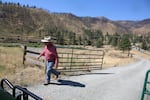Across 15,000 square miles of rural Oregon, one judge presides.
He routinely shuttles over the mountains and canyons separating courthouses in Grant and Harney counties, 70 miles apart. His authority covers an area twice the size of New Jersey, with just 0.2% its population.
As the head of a state circuit court, the Honorable Judge William Cramer hears about 1,000 cases each year. He has the power to sentence people to prison, and to decide the terms of probation. It’s his call when to be harsh and when to show mercy. He settles lawsuits and mediates child custody disputes.
In 23 years on the bench, Cramer has never been opposed for reelection.
But in January, the judge stepped down from his official capacity in the job.
Two men are running for the office.
One is Grant County’s head prosecutor, District Attorney Jim Carpenter, who 16 years after being formally reprimanded for dishonesty, now faces an Oregon State Bar complaint lodged by a former police officer.
The other candidate is a career public defender, Rob Raschio, who was vetted by state officials to serve as interim judge after Cramer retired. But Raschio was not appointed to the seat following questions raised in a state police background check.
Both candidates face serious criticisms for their conduct — from dishonesty to drunk driving — leaving Grant and Harney county voters to decide whose flaws they can accept when picking the next person to shape the criminal justice system in Eastern Oregon.
“Trial judges make decisions every day that can change the course of a person’s life,” said Lewis and Clark law school professor Susan Mandiberg, speaking generally of judicial elections. “If they have obvious discriminatory tendencies, they can really cause a lot of damage.”

Both candidates are already mainstays of the Grant County Courthouse in Canyon City.
Richard Hanners / Blue Mountain Eagle
The prosecutor’s record
Carpenter has been an elected district attorney since 2015. Even when first elected, he had a documented issue around his ethics.
He was publicly reprimanded for dishonesty by the Oregon Supreme Court in 2004. Justices found he posted anonymous messages about an acquaintance, implying that person had sexual relationships with students at the school where they taught and coached. The person faced angry parents, and a formal investigation at the school. Carpenter’s role was only revealed through a state police investigation. He later described his actions as a “practical joke.” The court questioned “whether Carpenter possessed the requisite trustworthiness and integrity to handle important matters,” according to an Oregon State Bar record of the rebuke.
Justices stopped short of suspending his license because they decided Carpenter, at age 36, “had no prior disciplinary record ... was inexperienced in the practice of law, and showed genuine remorse.”
At the time, an Oregon State Police sergeant named Gordon Larson had investigated a possible criminal case against Carpenter, and urged leniency from the state bar.
Now, at 52 years old and seeking to become a circuit court judge, Carpenter is again the target of a bar complaint — this time from Larson himself.
Larson retired as an OSP lieutenant in 2014 and lives in Grant County. In July, he lodged a complaint claiming the district attorney used his office to investigate Larson for posing a political threat.
The complaint came after Carpenter initiated a criminal investigation into Larson for allegedly making in-person audio recordings of their conversations without Carpenter’s knowledge.
In Oregon, it’s legal to record a phone call without telling everyone on the line the recording is being made, if the people on the phone are in the state. Just one party on the call needs to know. In-person, secret recordings are different and could lead to misdemeanor charges, though many interactions with law enforcement are exempt.
Larson denies the recordings he made of Carpenter were in-person.
He said recording their phone calls was part of an anti-corruption mission. Larson has said the Grant County Sheriff’s Office is linked to extremist militias, and that crossing county Sheriff Glenn Palmer during the Malheur National Wildlife Refuge occupation unleashed death threats and retaliation on him, including a costly court battle over water rights, in which Larson ultimately prevailed.

Retired OSP Lt. Gordon Larson on his ranch near Canyon City, August 28, 2019.
Emily Cureton / OPB
In April, Larson’s attorney sent Grant County a demand for $783,000 in civil damages, alleging county employees participated in a plot to damage Larson. In addition to being the district attorney, Carpenter serves as the county’s general counsel and would be responsible for defending against the lawsuit.
By June, Carpenter assigned a deputy prosecutor to find evidence against Larson regarding the phone recordings.

Grant County District Attorney Jim Carpenter told the Blue Mountain Eagle of actions that led to a formal reprimand in 2004: "“That mistake has helped me to realize that people can change."
Rudy Diaz / Blue Mountain Eagle
Assistant District Attorney Riccola Voigt went so far as to send OPB a grand jury subpoena, a powerful legal demand used to obtain evidence in criminal prosecutions. It commanded OPB to release reporting materials including “complaints” about elected law enforcement officials in Grant County, namely Carpenter and Palmer. OPB did not comply with the unusual request.
“To see such a blatant misuse of a system I believe in is not only offensive, it is terrifying,” Larson wrote in a bar complaint.
Larson said he has recorded calls and pressured Carpenter with them because he wanted the prosecutor to call the sheriff dishonest, and trigger a legal proceeding known as Brady disclosure, which would have far-reaching implications for the sheriff’s credibility as a witness in court.
Carpenter said he opened an investigation into Larson’s recordings because he felt he was being attacked.
“I just decided I needed to put the brakes on these former [Oregon State Police] guys thinking that they can threaten me,” Carpenter said.
Larson isn’t the only former state police officer to target Carpenter’s ethics for state review. In July, the state bar dismissed a second complaint from former OSP Senior Trooper Steve Schuette, who filed a complaint after the sheriff was called as a witness for the first time in years. It alleged the district attorney isn’t doing enough to prevent Palmer from testifying in criminal court cases.
Larson’s bar complaint against Carpenter is still under review.
After OPB questioned Carpenter about the appearance of conflicts of interest in a criminal investigation where he’s the alleged victim, his employee is the prosecutor, and the defendant is a longtime colleague who once investigated him for his own misdeeds, he called the inquiry into Larson “pretty much dead.”
The nixed appointment
When Cramer announced he planned to retire last fall, Oregon Gov. Kate Brown called for applicants to serve as interim judge until 2021.
Governor’s office emails show public defender Rob Raschio was the only finalist for the job, triggering a background check.
Raschio heads a law firm that contracts with the state to provide public defense services in Grant, Harney and Baker counties.
In 2010, he was cited for driving under the influence of intoxicants in Clackamas County. He pleaded guilty, completed a diversion program, and the charge was dismissed.
In June, the governor’s office released a partial copy of Raschio’s background check with pages blacked out. The state left in a single reference to an unsubstantiated criminal allegation, while removing all the details.
“Oregon State Police investigators allow interviewees to request confidentiality so that they can be forthcoming with any information they might have about a subject,” Brown’s spokesperson Charles Boyle responded, adding that the state is legally required to withhold information gathered this way.
Raschio claims he has not and will not personally read the document, in which OSP Detective James Koehler summarized contact with more than a dozen of his acquaintances and colleagues.
Some described Raschio as a passionate advocate, articulate and hard working.

Rob Raschio has served on the Burns City Council from 2003-2006 and as an appointed Grant County commissioner in 2018.
Rudy Diaz / Blue Mountain Eagle
But in the section about potential conflicts of interest, the detective listed both Grant and Harney county district attorney offices, and all the circuit court employees.
“Mr. Raschio talks down to all of them,” trial court administrator Tammy Wheeler told the detective, according to Koehler’s notes.
Wheeler has worked for the Grant and Harney county court more than 20 years, and known Raschio since his first job as a trial lawyer. The remarks attributed to her in the detective’s report portray Raschio as dismissive to court staff, angry at times and “like a chameleon.”
Last summer, Wheeler confronted the defense attorney. It did not go well, according to the detective’s notes: “[Mr. Raschio] blamed everyone else and became angry.”
Wheeler also related an incident from 20 years ago, when she said she overheard him make a sexist and racist remark about an opposing prosecutor from Harney County.
Raschio denied the characterizations.
“I swear from time to time, over frustration, but I never swear at people. I don’t demean people. I don’t talk down to people, in my view,” he said.
Wheeler declined to comment for this story. If elected judge, Raschio will be her boss. He hedged when asked if the trial court administrator’s comments to the detective would affect her employment.
“I have no comment about that. I don’t know the answer to that question. I will work with her,” he said. “I’m not going to prejudge anything.”
Cramer, the exiting judge, also talked to the detective without opting for confidentiality.
The judge described Raschio’s professional conflicts with opposing attorneys getting personal.
“Judge Cramer stated he felt, but was unsure, Mr. Raschio had withheld or misrepresented information to the court,” the detective wrote, adding: “[The judge] did state he generally finds Mr. Raschio ethical.”
Still, the judge appears to have tried to block his appointment. On Jan. 11, Cramer sent an email to the governor’s office to argue that the appointment shouldn’t happen, and would create major scheduling problems if a different judge is ultimately elected by voters. Still, Brown’s office continued to pursue a background check of Raschio. Only weeks later, after the detective had completed his report, did Brown change course, citing the “logistical issues” raised by the judge.
Cramer later explained his interview with the detective in an email shared with reporters, Raschio and Carpenter.
“I do want to clarify that there was nothing in the interview that indicated Rob Raschio was anything but qualified for the position in my opinion based upon his legal work before me,” Cramer wrote. “As to demeanor, I let those stand. I did need to address issues between attorneys when they affected the functioning of the court.”
Raschio promised that, if elected, he’ll move past conflict with opposing prosecutors, and that “when roles change, behaviors change,” he said. “We’re a small place, and we have an obligation to the people of this place to make sure that we’re doing the very best jobs we can.”
Staying power
Raschio received 47% of votes in the May primary. Carpenter, the district attorney, got 33%. With no majority winner, both men advanced to the general election. Both register to vote without any party preference. Raschio has donated to Democrats, including the governor and former House majority leader Jennifer Williamson.
Whoever wins the judicial election, they are likely to have power for years, if not decades. Even in urban counties, circuit court judges often go unopposed. And in rural Grant and Harney counties, the judge hasn’t been opposed since before some voters were born.
“Most voters don’t know anything about the judges. Judges rarely have election campaigns,” said Mandiberg, the Lewis and Clark law professor.
Usually it takes a high profile issue or a controversial decision to drive public awareness. It can be hard to find the upside of challenging a powerful person. That may be particularly true in a judicial race where both candidates have had documented clashes with people in the small community.
There are few checks on a trial judge’s power, Mandiberg said. Appellate courts can overturn legal decisions, and there’s a process for making complaints of bias and discrimination through the state’s judicial fitness commission. But that, she added, is only “for the rare cases where people actually have the nerve to file a complaint against a judge.”

A ballot drop box outside the Grant County Sheriff's Department, August 29, 2019.
Emily Cureton Cook / OPB
